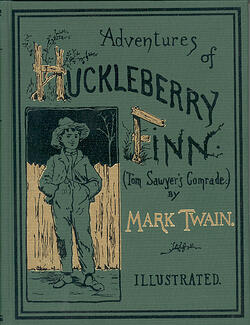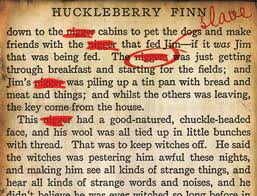The Adventures of Huckleberry Finn
Adventures of Huckleberry Finn (or, in more recent editions, The Adventures of Huckleberry Finn) is a novel written by Mark Twain. It was first published in the United Kingdom in December 1884, followed by the United States release in 1885. Huckleberry Finn has been criticized, censored, and banned for several reasons including obscenity, atheism, bad grammar, coarse manners, and low moral tone.[1] Despite the controversies, the novel has remained a staple in high school literature study because teachers seek to engage students with texts that provoke discussion and questions.[2] This book was intended by Mark Twain to be a sequel to The Adventures of Tom Sawyer. He planned to follow Finn's life from childhood into adulthood in this book. After several years of work, the story failed to develop and the manuscript was put aside. One day, Twain had a trip to the Hudson River where he found inspiration and decided to resume writing. In the end, the Adventures of Huckleberry Finn becomes one of the United States’ beloved novels and one of the first examples of vernacular writing in American literature.[3]
Plot
The book tells the story of young Huckleberry Finn and Jim, a runaway slave, as they travel by raft on the Mississippi River. Huck Finn is a rebellious teen who fakes his own death to escape an alcoholic father. Jim, a runaway slave, provides friendship and protection while the two journey along the Mississippi on their raft.[4] During the journey Huck face a different kind of characters and types which the book portrays almost every class living on or along the river. As a result of these experiences, Huck overcomes conventional racial prejudices and learns to respect and love Jim.[5]
Controversy
Even though the novel is named after Huck, his companion Jim, enrages most of the readers. Jim, as a fugitive slave, is having racial bias in his depiction, which is most often the reason for calls to remove the book from classes and libraries.[2]
The most controversial aspect of Huckleberry Finn is the use of racially charged language. Some critics objected to Huck Finn's racial content and noted that Twain uses the word "nigger" 213 times in the book. Even though there are also people who believe that Twain intended the book as an attack on racism, others argue that Twain failed to rise above racial paradigms of the time. According to the American Library Association, Adventures of Huckleberry Finn was "the fifth most challenged book in 2007, the reason cited was “racism.”[3]
In 2011, Auburn University professor, Alan Gribben, published a new edition that replaced the word “nigger” with “slave.” This action created a debate over readers whether or not it was the right thing to do to "clean" the language used by Twain.[3]
References
- ↑ https://homepages.wmich.edu/~acareywe/huck.html
- ↑ 2.0 2.1 https://blogs.loc.gov/teachers/2013/11/mark-twains-huckleberry-finn-controversy-at-the-heart-of-a-classic/
- ↑ 3.0 3.1 3.2 https://blog.bookstellyouwhy.com/why-all-the-controversy-huckleberry-finn
- ↑ https://www.gradesaver.com/the-adventures-of-huckleberry-finn/study-guide/summary
- ↑ https://www.britannica.com/topic/Adventures-of-Huckleberry-Finn-novel-by-Twain

